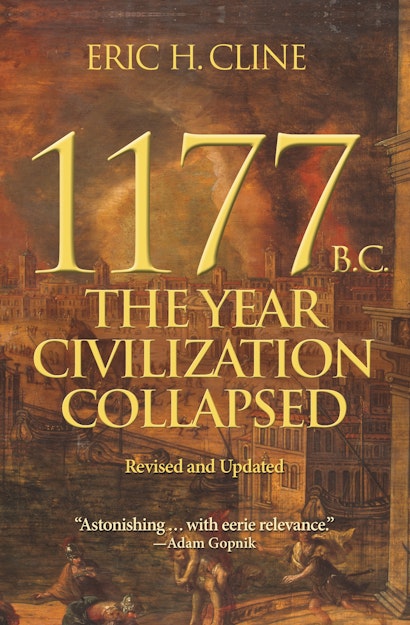This month’s Book Club Pick is Eric Cline’s bestselling book, 1177 B.C.: The Year Civilization Collapsed. As we head into summer, this bold and breathtaking book is a terrific book club choice and it is sure to lead to lively discussion. In 1177 B.C., marauding groups known only as the “Sea Peoples” invaded Egypt. The pharaoh’s army and navy defeated them, but the victory so weakened Egypt that it soon slid into decline, as did most of the surrounding civilizations. Cline tells the gripping story of how the end was brought about by multiple interconnected failures, ranging from invasion and revolt to earthquakes, drought, famine, and the cutting of international trade routes. Bringing to life a vibrant multicultural world, he draws a sweeping panorama of the empires of the age and shows that it may have been their very interdependence that hastened their dramatic collapse. Recently revised and updated, 1177 B.C. sheds light on the complex ties that gave rise to, and eventually destroyed, the flourishing civilizations of the Late Bronze Age—and set the stage for the emergence of classical Greece and, ultimately, our world today. Writing in the pages of the New Yorker, Adam Gopnik noted, “The memorable thing about Cline’s book is the strangely recognizable picture he paints of this very faraway time.” 1177 B.C. is an ideal pick for readers who are interested in ancient history; it is packed with detail, reads like a mystery, and is unputdownable.
The discussion questions below are meant to guide your conversations, and we encourage you to share highlights from your discussion—and pictures!—via social media, using hashtag #ReadPUPforBookClub.
Discussion Questions
- In 1177 B.C., the author traces the dynamic social, economic, and cultural links between the civilizations of the Eastern Mediterranean—Egypt, Minoan Crete, Mycenaean Greece, the Hittite Empire, and Kassite Babylonia—and their cataclysmic demise during the late second millennium B.C. What was it about the Bronze Age Collapse that intrigued the author enough to write 1177 B.C.?
- Why was the Late Bronze Age “the first truly global era,” as the author says in the book? Why were these ancient societies connected so strongly?
- What really happened in 1177 B.C., the eighth year of reign of Ramses III? Why is that year so crucial for ancient history? Why did the author select this date as the title of the book?
- Within 1177 B.C., the author claims that decline began as early as c. 1250 C.E. and as late as c. 1130 B.C., depending on geographical location. How important is the date 1177 B.C. in our understanding of the Bronze Age’s termination? Do you agree with the author that this was a turning point in history? The author wonders in the new introduction whether 2020 will also be a key turning point in history—do you agree?
- As there is no scholarly consensus on the cause of the Bronze Age collapse, which factors do you think contributed most significantly to the decline of the Bronze Age? Do you think one is most important, or do you believe a combination of factors led to the decline?
- Among the several causes explaining this downfall, scholars mention an invasion by “the people from the sea.” Who do you think these people were, where did they come from, and where did they go?
- The Bronze Age Mediterranean was highly interconnected with trade routes. What do you think we can learn from these ancient trading routes and relationships in our own highly globalized world?
- Is our age comparable to the Bronze Age? What similarities do you find between the Bronze Age and today? Are those parallels particularly unique to that era and ours (i.e., the role of climate or the failure of broad international economic ties/diplomacy?) Could you find some parallelism between the end of the Bronze Age and our current crisis?
- In many places in the book, the author suggests that these remote events may have some link with the present, or some lesson to teach us. Do you think we should continue to excavate and study this period of history?
- The author is currently at work on a sequel, tentatively entitled After 1177. What would you hope to have answered in that book?
av������ the Author
Eric H. Cline is professor of classics and anthropology and director of the Capitol Archaeological Institute at George Washington University. An active archaeologist, he has excavated and surveyed in Greece, Crete, Cyprus, Egypt, Israel, and Jordan. His many books include From Eden to Exile: Unraveling the Mysteries of the Bible and The Trojan War: A Very Short Introduction. Twitter @digkabri

